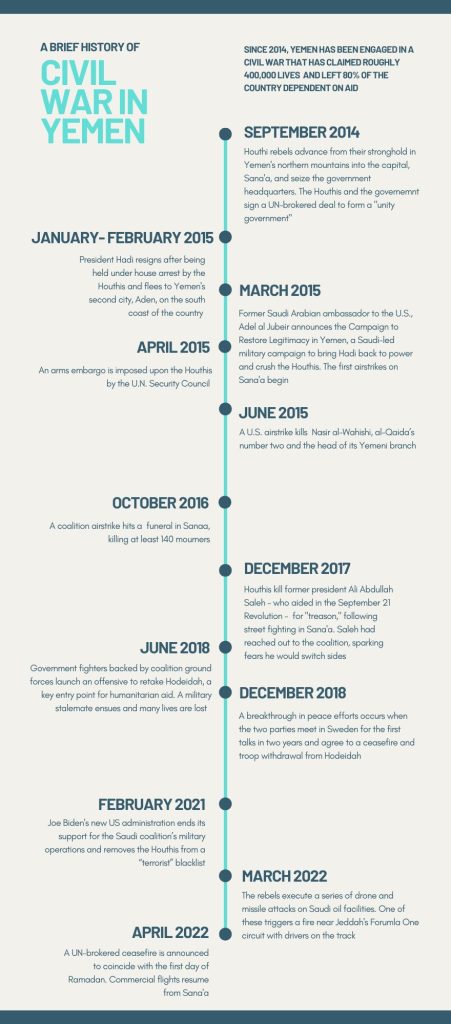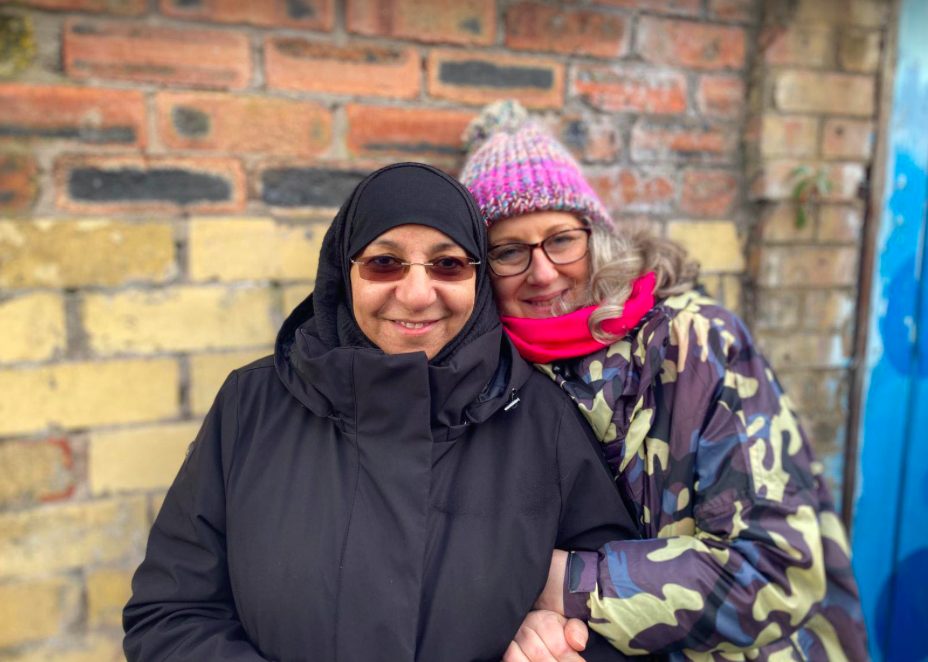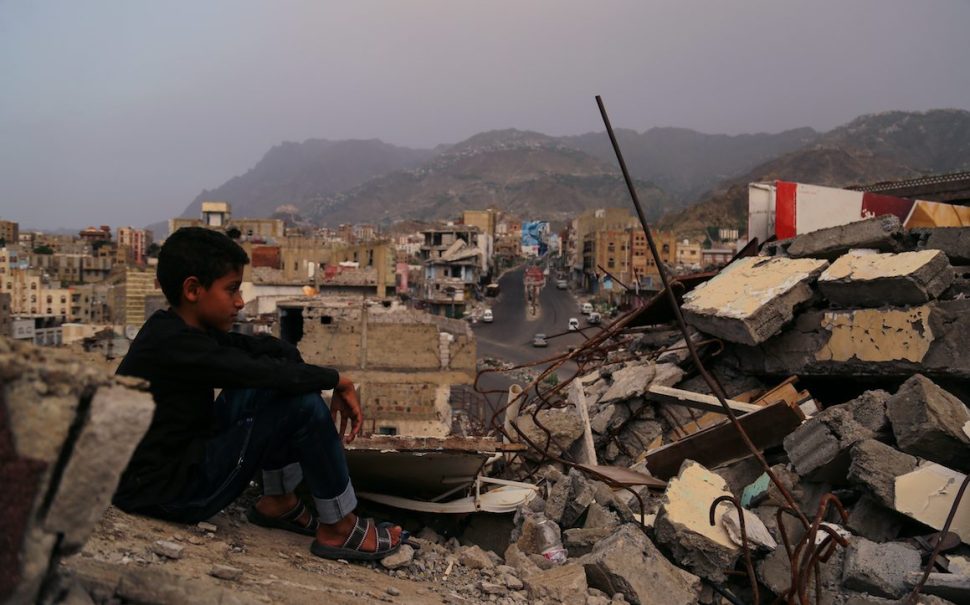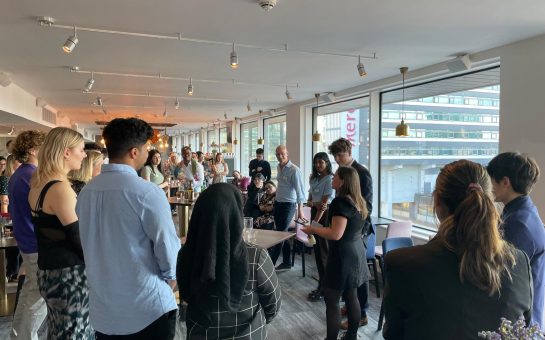A short while before Christmas, black smoke rushed through the shattered windows of the Al-Sabeen Hospital in Sana’a, Yemen’s capital. Children were screaming, pregnant women were hurriedly moved into the hospital corridors.
A bomb had been launched by the Saudi-led coalition at a nearby bridge in an attempt to disrupt the Iran-backed Houthi rebels, who control the city. It was the latest escalation in a war that has rolled on for seven years and caused what the United Nations described last year as the worst humanitarian crisis on earth.
The war has played out since 2014, when the Houthis seized control of Sana’a, then proceeded with a full takeover of the Yemeni government in the September 21 revolution. The previous government – led by Abdrabbuh Mansur Hadi – was pushed back into the Southern Provinces. Hadi fled the country and a series of air strikes began from a coalition of forces led by Saudi Arabia in a bid to reinstate him.
The bomb missed the bridge, instead crashing into the nearby Al-Saleh Mosque, just a few minutes walk from the hospital. In the below video, activists can be seen inspecting the damage to their place of worship. It was yet another near escape for the hospital.
Dr Najla al-Sonboli, who runs the paediatric unit at al-Sabeen, studied her PhD and masters at the Liverpool School of Tropical Medicine (LSTM). Over the past few years, her friends from LSTM, along with an ever-expanding band of volunteers and friends, have been running a stall at the Granby St market in Toxteth, named Habibti – ‘my love’ in arabic. They send regular sums of money to pay for everything from staff bus fares (many of the doctors otherwise sleep in their cars to save money) to the rebuilding of the entire A&E reception (a necessity after a direct hit in 2016).
Al-Sabeen currently runs the only functioning paediatric intensive care unit in the whole of Yemen. The support of Habibti is much of the reason why. Louise O’Brien, one of several people involved with the stall, says that “Liverpool as a whole seems to have taken this incredible doctor and her story to heart.”
Parents bring children from all across Yemen’s vast expanses to the hospital, often from IDP (internally displaced person) camps that have been set up for people fleeing the most endangered parts of the country.
A baby named Hussein who was likely to die of starvation was brought to the hospital and Habibti funding was able to pay for his travel and hospital treatment. Dr Najla treated him, and after a month he was feeling rejuvenated and was able to leave the camp. Then six months later, he passed away due to chickenpox. “The level of suffering is beyond any imagination,” says Louise.
Dr Najla’s friends in Liverpool didn’t find out about the near miss with the bomb until the New Year. She had delayed letting them know before Christmas out of fear it might cast a shadow over their festivities. Besides, bomb strikes are nothing new, they occur somewhere in the city virtually every night.

Human appeal in Yemen
It was in a small, squat flat in Manchester in 1991 that Human Appeal was founded. Based in Cheadle, it has since become one of the leading charities supporting countries like Yemen in the World.
“For sure, the people of Manchester and in the UK often show a lot of empathy when we walk to them about what is happening, but in general the levels of awareness are not very high,” says Raya Homsi, global partnerships and grants manager at Human Appeal. A poll conducted in 2017 by the group showed that only 49% of people in the UK knew there was a conflict in Yemen at all, let alone that it was weapons supplied by the British government to Saudi Arabia that were being deployed.
She also takes issue with the nature of what coverage does exist in relation to the Yemeni crisis. “It only focuses on the vulnerability of the people rather than the resilience and showing the real roots behind the problem,” says Raya.
The hardest thing for Human Appeal, and other groups based in Yemen, is often accessing the IDP camps in the first place. “Our cars cannot pass through many of the roads, they are very, very narrow and the only way you can pass through is on donkeys.”
Then there is the issue of police presence around the camps, or the rigorous security and political barriers. Sometimes it can take up to six months to even get permission to start on a project, or several months to deliver a single item. “It is a huge hassle, the situation is always liable to change at the last minute,” says Raya.
She accepts that the staff her organisation have stationed in Yemen are in real danger every time they go to work. “They live in a very, very different world,” she says. They are currently in the process of building shelters for people living in tents in camps and upgrading them to be more durable, but have several other projects ongoing – providing food packages, solar water wells, wheelchairs and even cataract surgery.
But neither Raya nor any of the team are naive about the scale of what they face. The total death toll since the start of the war has ran into the hundreds of thousands – either those killed directly through bombings or indirectly due to the huge resource scarcity. Around 80% of the country now depends on aid. Roughly 70% of fatalities are children under five years old. Millions are refugees in their own country, as borders and airspace are sealed.
Yemen’s past and future
Faiza Alasaly is a Yemeni lady, born in a small village in the mountains, who moved to England as a child in 1971. She helps out with the Habibti stall at Granby St market and is a friend of Louise. She tells me that the recently bombing of the communications tower in Sana’a blew out the stained glass windows of the house her mother built in the city before she died.
Faiza can recall many of the stories her mother told her about previous conflicts in Yemen during the 1960s. As there was no telecommunications, someone had to travel many miles from her cousin’s village to come and tell her Auntie that her daughter – who was six months pregnant with her fourth child – was very unwell. “She was told she needed to go and visit her straight away,” she says.
The auntie got a lift back in the car that had come up to visit and as they drove the several hour journey back there were bombs dropping on other sides of the road. Faiza likens it to a video game. “The driver risked his life so she could go,” she says. When they arrived, they discovered that both her daughter and the child had died within the last half an hour.
This was decades ago, but for many older people in Yemen time barely feels linear, instead they find themselves re-living the horrors they thought were behind them. “The people of Yemen have been bombed back in time,” says Louise.
At the start of April news broke from Yemen that the Houthis and the Saudi coalition had agreed to a first ceasefire in six years, timed to coincide with the beginning of Ramadan.
Since then, civilian casualties have dropped dramatically, 95 in April down from 213 in March, according to the Norwegian Refugee Council (NRC) – an aid group who provide food and shelter to Yemen – citing data from the Civilian Impact Monitoring Project. Even still, neither Faiza, Louise or Raya are confident it will last.
Certain people who have visited the hospital in Sana’a rely on the language and imagery of religion to describe Dr Najla. One man who visited with his wife told Louise she had a “saintly aura” and found it difficult to untangle the notions of healing and miracles when in her presence. It is a mechanism of understanding hope within immense suffering.
As for her own life, Dr Najla says she works without fear. In correspondence to Louise she wrote, “When I see a lot of kids died inside their homes in their mother’s lap by the rockets and bombs, I never care about death while I am serving them.”
In 2018 Dr Najla was given the Heroine of Health award at the World Health Assembly in Geneva. A year later she was awarded an honorary doctorate at the School of Tropical Medicine. She tells Louise she would like to return to England one day, to see old friends and to stop by at Kimos – her favourite Middle Eastern restaurant on Mount Pleasant Road in Liverpool. She accepts this will likely not be any time soon.
Main picture credit: A child sits on the ruins of his home in Yemen (akramalrasny/Shutterstock)





